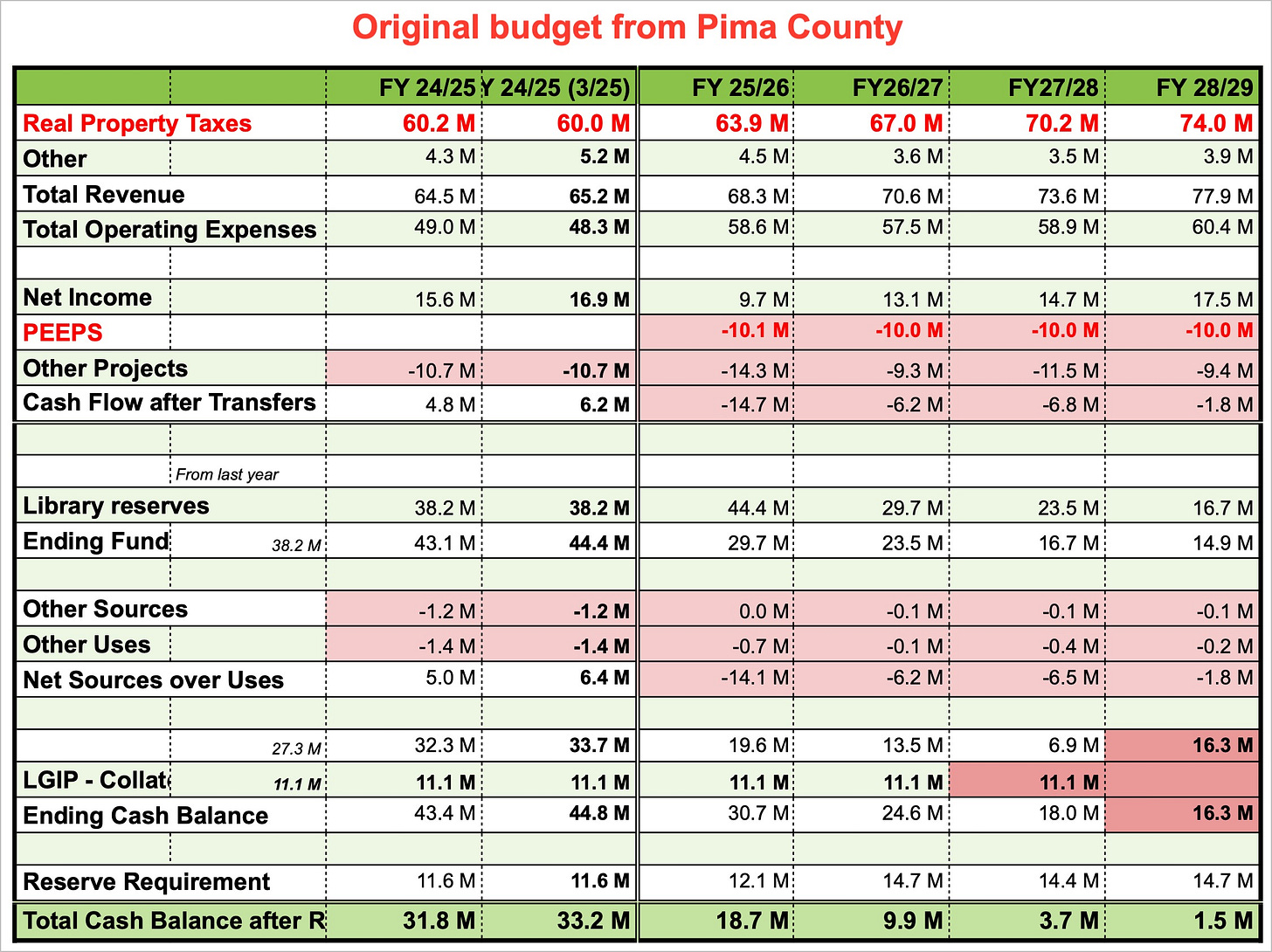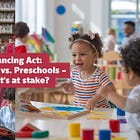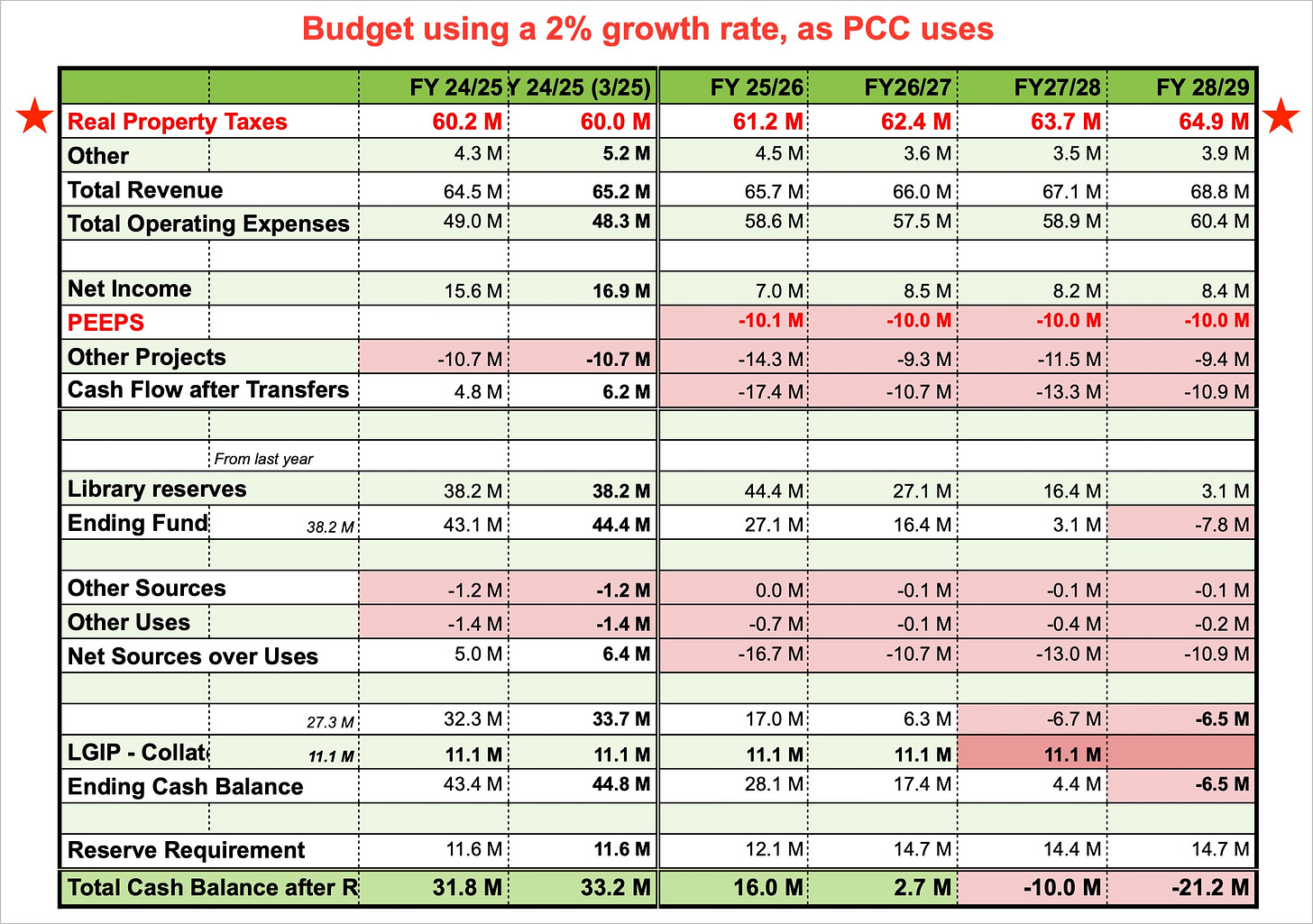🔥 Pima County's Budget Reveals More Problems Than It Solves: How Pima County's Optimistic Projections Hide PEEPs Funding Crisis Hitting Libraries
County officials claim PEEPs funding is "sustainable" while their own numbers show impending collapse. Why is the county projecting 6% growth when PCC expects only 2% from the same tax base?
😽 Keepin’ It Simple Summary for Younger Readers
👧🏾✊🏾👦🏾
📚🏦 Pima County is using money that was saved for libraries to pay for preschool programs. They're taking about 💰$10 million each year from the library's 💼 savings account. The county says this plan will work forever, but when you look at the 🔢 math, the library's savings will run out in just a few years ⏳.
The county is also being too optimistic about how much money they'll collect from 📈 property taxes. If they're wrong about that, the money will run out even faster ⚠️. This means that in a few years, they might have to close some libraries 📚❌, cut the preschool program 🎒✂️, or make people pay higher taxes 💸📈. Both libraries and preschools are important, and they should each have their own reliable money source instead of taking from one to pay for the other ⚖️.
🗝️ Takeaways
📉 Pima County claims PEEPs funding is "sustainable" through the Library District, but their own projections show cash reserves plummeting from $44.4M to just $1.5M above required reserves by FY 2028/29
💰 The county's budget relies on 6%+ annual property tax growth, while Pima Community College (drawing from the same tax base) projects less than 2% growth
🧮 When using realistic 2% growth projections, the Library District becomes completely insolvent by FY 2027/28 with negative balances exceeding -$21M by FY 2028/29
🏠 If property values actually grow at the county's projected 6%+ rate, housing prices would increase by over 24% by 2029, worsening the affordability crisis
🗳️ County officials are creating a ticking financial time bomb that will explode just in time for the next election cycle, forcing difficult choices between cutting libraries, slashing preschool funding, or raising taxes
📚 This manufactured crisis creates a false choice between library services and early childhood education when both deserve sustainable funding
The Great Library Heist: How Pima County's Preschool Program Is Being Built on a Financial House of Cards
¡Qué vergüenza! Once again, our communities are being forced into false choices between vital services while the wealthy continue getting tax breaks.
The recent memo from Pima County Administrator Jan Lesher (May 15, 2025) makes a bold claim: the Pima Early Education Program (PEEPs) will become "a permanent County program" funded by the Library District starting July 1.
However, a closer examination of the budget numbers reveals a truth that county officials are desperately trying to hide. This funding scheme is mathematically unsustainable and will lead to a financial collapse of both the library system and preschool program within a few short years.
The Shell Game: How We Got Here
Let's start with some context for those who may be unfamiliar with this situation. The Pima Early Education Program (PEEPs) provides preschool access to low-income families, and the county has agreed to pay around $10 million per year for the program.
Initially funded through the American Rescue Plan Act (ARPA), PEEPs now faces a financial cliff as those federal dollars run out and the city cuts all its funding for PEEPS. Rather than seeking voter approval for a dedicated funding source, county officials made a fateful decision: redirect money from the Library District's reserves.
According to our previous investigation, the Pima County Free Library District has been a model of fiscal responsibility, consistently spending less than it collects in tax revenue. This prudent management resulted in a healthy reserve fund of approximately $38 million. Instead of reinvesting this money in library services, the Board of Supervisors decided to raid these reserves to fund preschool education.
As we reported earlier, the Southern Arizona Leadership Council (SALC) helped engineer a "creative interpretation" that classified preschool funding as "early childhood literacy" to justify using library taxes for PEEPs. This allowed the county to divert $10 million annually from the library system without explicit voter approval.
The Numbers Don't Lie
The May 15 memo from Jan Lesher attempts to reassure the public that the Library District can sustainably support PEEPs "without compromising library operations and services."
But the financial projections included in the very same memo tell a different story.

Looking at Attachment 2 (the Library District forecasted cash flow), we see that by FY 2028/2029:
The cash balance is projected to decline from $44.4 million in FY 2024/25 to just $16.3 million
After accounting for the required 3-month reserve ($14.7 million), only $1.5 million would remain
Every year from FY 2025/26 onward shows negative cash flow
Even more concerning is that these projections rely on an extraordinarily optimistic growth rate for property tax revenues. The county is assuming property tax revenues will grow from $60 million to $74 million by FY 2028/29, without raising library taxes, an annual growth rate exceeding 6%.

Meanwhile, Pima Community College (PCC), which draws from the exact same tax base, is projecting less than 2% growth for the coming year. This isn't a minor discrepancy - it's a fundamental disagreement about future tax revenues that dramatically changes the financial outlook.
What Happens When We Use Realistic Growth Projections?
The picture becomes dire when we apply the more realistic 2% growth rate that PCC is using. As shown in the alternative budget projection above, with a 2% growth rate that PCC is using for the same population:
By FY 2027/28, the Library District would have a negative cash balance of -$6.7 million
By FY 2028/29, this would worsen to -$21.2 million after accounting for reserve requirements
The fund would be completely insolvent years before the county's projections suggest
Claro que sí - the county's "permanent" funding solution will collapse before the next presidential election.
The False Choice
This manufactured financial crisis creates an impossible choice for Pima County residents: support libraries or support preschools. It's a false dichotomy that pits essential services against each other while ignoring the root causes of our funding challenges.
The wealthy and corporate interests continue enjoying tax breaks while working families are told there simply isn't enough money for both quality libraries AND early childhood education. As Mayor Regina Romero correctly identified, "A flat tax on income really favors corporations and the wealthy in Arizona."
Let's be clear: this is not a natural scarcity. It is a politically manufactured one.
The Trump Effect: Housing Affordability Crisis
The county's optimistic projections also create another concerning scenario. If property values actually do increase at the 6%+ rate the county is projecting, that means by 2028/29, housing prices would be over 24% higher than today.
In a region already struggling with an affordability crisis, such dramatic increases would push homeownership even further out of reach for working families, especially in Indigenous and Latinx communities.
Supervisor Matt Heinz's proposed three-cent property tax to help with affordable housing would be a mere drop in the bucket compared to such massive increases in property values (24%) that the county uses to balance its library budget. Once again, working people would bear the brunt of this financial strategy while developers and property investors reap the benefits.
County projections for the library budget are that the average home price of $400K will be over half a million by the next election… that’s the math they use to prove PEEPS is sustainable. Is 24% growth sustainable?
The cruel irony is that many families who benefit from PEEPs preschool services are the same ones who rely on libraries and who would be devastated by ever-increasing housing costs. Es un círculo vicioso - a vicious cycle that traps our communities between unaffordable housing and underfunded services.
What Happens When the Money Runs Out?
The county's own documents acknowledge the unsustainability of this funding approach. According to a September 10, 2024 memo cited in our previous investigation, "The Library District does not have sufficient revenue streams to sustain a $10 million PEEPs program on an annual basis without significant restructuring."
So what happens when the reserves are depleted? The county has already developed plans for "Strategically Recalibrating Small Branches" and "Reimagining Staffing" - bureaucratic euphemisms for library closures and staff cuts.
By FY 2028/29, right as we head into the next presidential election cycle, supervisors running for re-election will face a library budget in crisis.
They'll be forced to either:
Cut library services dramatically
They tried this last year and faced a massive public backlash
Slash PEEPs funding
They just made it permanent and want to expand it according to memos
Raise taxes significantly
You still cannot raise the library tax enough to avoid the coming crisis
Some combination of all three
None of these options will be politically palatable. So why are county officials pushing a funding model they know will collapse?
The Political Calculation
The timing is not coincidental. By exhausting library reserves to fund PEEPs through FY 2028/29, current county officials can claim credit for expanding preschool access while leaving the inevitable fiscal reckoning to future boards, county administrators, and library directors. It's a classic example of kicking the can down the road.
This approach allows the current Board of Supervisors to avoid making difficult but necessary decisions about creating dedicated, sustainable funding for early childhood education. Instead, they've opted for the path of least resistance: draining library reserves until there's nothing left.
Es puro teatro político - it's pure political theater that ultimately hurts the communities these programs are meant to serve.
A Better Way Forward
Both libraries and early childhood education deserve proper funding. Both are essential services that strengthen our communities and create opportunities for future generations. The question isn't whether we should fund one or the other, but how we can sustainably fund both.
Here are some alternatives the county should consider:
Create a dedicated funding source for PEEPs - Ask voters to approve a specific tax or fee designated for early childhood education rather than raiding library reserves.
Advocate for state-level funding - Arizona ranks near the bottom nationally in education funding. Our county officials should be fighting for our fair share from the state rather than cannibalizing local services.
Implement progressive funding mechanisms - Rather than relying on regressive property taxes that burden working families, explore funding options that ask more from those with the greatest ability to pay.
How You Can Make a Difference
Despite the troubling findings of this investigation, there is reason for hope. When communities become informed and engaged, positive change follows. Here's how you can help:
Attend the next Board of Supervisors meeting, Tuesday, May 20th - Make your voice heard during the Call to the Public.
Contact your Supervisor - Let them know you support both libraries AND PEEPs but want transparent, dedicated funding for each. Demand they explain why they're pursuing an unsustainable funding model.
Spread the word - Share this investigation with friends, family, and neighbors who care about libraries, education, and transparent governance.
Support independent journalism - This type of investigative reporting takes time and resources. Your support enables Three Sonorans to continue holding power accountable. Consider subscribing to our Substack to help maintain independent journalism in Southern Arizona.
As we navigate the challenges of the Trump Era, with its attacks on public education and growing inequality, our communities need solidarity, not division. By rejecting false choices and demanding sustainable funding for essential services, we can create a Pima County that values both libraries and preschool education as vital investments in our shared future.
¡Juntos podemos! Together, we can build a more just and equitable community that meets the needs of all our families.
What do you think about the county's approach to funding PEEPs through library taxes? How would you prefer to see both libraries and early childhood education funded in our community?
Leave your thoughts in the comments below.
¡Hasta la victoria siempre!
Have a scoop or a story you want us to follow up on? Send us a message!









